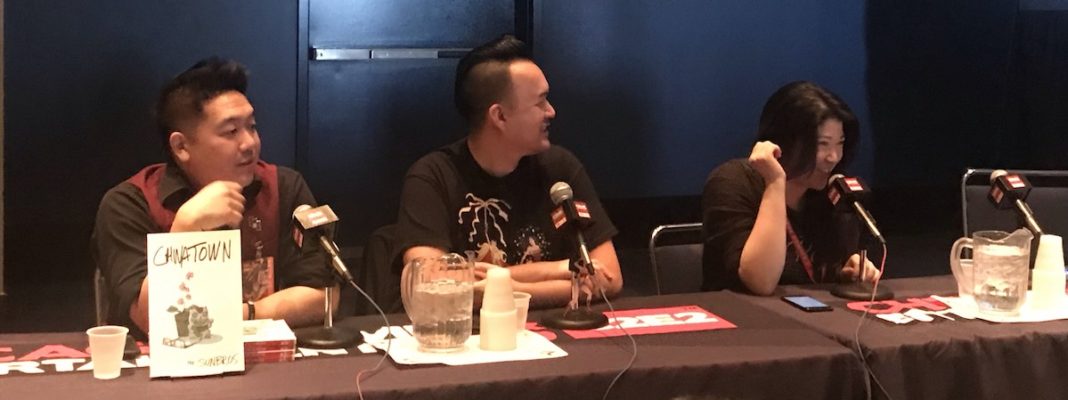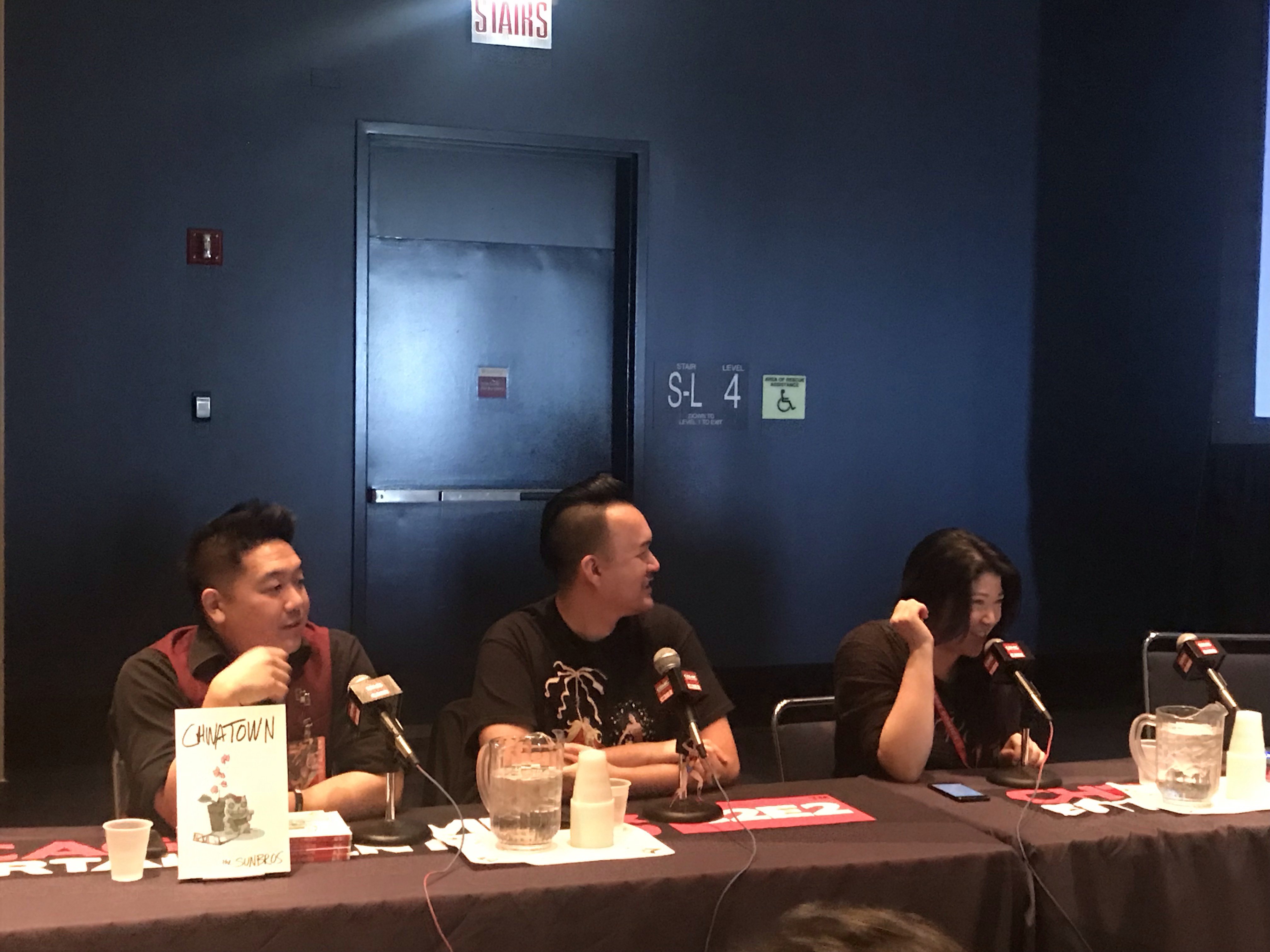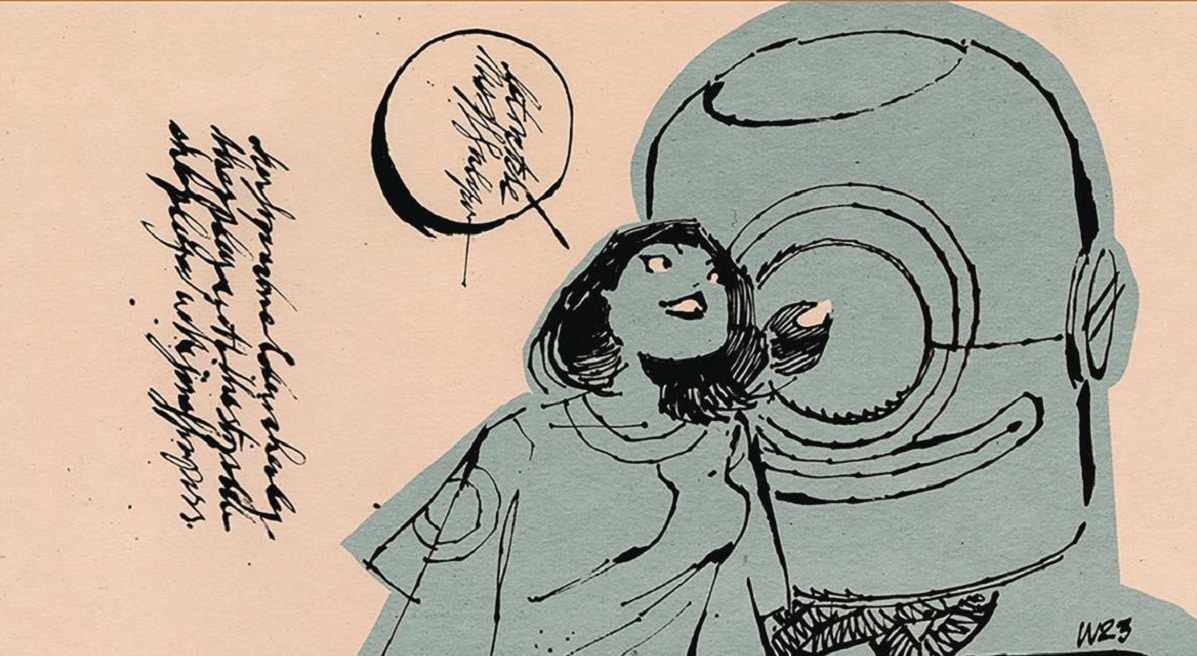Kicking off the first round of Saturday panels at C2E2, Wesley Sun, Dawn Xiana Moon, Mark Martell, Mary Anne Mohanraj, and Michi Trota are here to discuss Asian-American representation in pop culture, the difference between diaspora and homeland perspectives, and examine the past and current contributions of Asian-Americans.
Wesley Sun, son to Malaysian parents, is part of Sun Bros Studios, a comic publisher he operates from Chicago with his brother, Brad. Sun also is a chaplain at Cook county jail as well as a professor.
Mark Martell was born in the Philippines, grew up in Miami, Florida and moved to Chicago in 2000. He now works at the University of Illinois at Chicago where he teaches courses about pop culture, Asian-Americans and diversity issues in higher education.
Mary Anne Mohanraj writes for George R.R. Martin’s Wild Card series, teaches and even works on video games. She also runs SLF, a speculative literature foundation featuring and supporting new writers of color.
Michi Trota is the managing editor and nonfiction editor for Uncanny Magazine, a three time Hugo award winning publication. The first Filipina to win a Hugo award , her writing focuses heavily on geek culture and food.
Dawn Xiana Moon is the founder/director of Raks Geek, a bellydance and fire performance company known for featuring a belly dancing Wookiee. She’s also a singer/songwriter with two albums of original music, a user experience designer, and web developer.
Asian-American representation is an uphill battle, looking at Marvel movies, comics, even the panel room itself. There’s a huge array of people, all with different perspectives that deserve to be heard. Even though a group of people doesn’t fill in a specific (white) box, doesn’t mean it’s not worth hearing. There’s a surge of representation in Hollywood that, though until recently has been stereotypical, there’s an uprising against that norm. This surge is the beginning of an era. Hollywood sees the popularity of films like Black Panther and Crazy Rich Asians, and, hopefully, is realizing diversity is worthwhile.
Moon adds that she’s always thrilled when she sees Asian-American writers, especially growing up where most people didn’t look like her. She remembers going to the bookstore to look for Asian authors and buying their books just so she could see understand her cultural background.
Sun agrees. Authorship, to him, is an extremely different beast when it comes to representation. In his experience, folks tell him they try to only buy books with characters of color – but that doesn’t mean it’s coming from an actual person of color. To him, the more important question is, who is writing these characters? Who is casting these actors? If they’re still white men, there are still issues.
Mohanraj said she had a similar issue in which she subconsciously wrote most of her stories starring white characters.
Greg Pak is an important name these days, Trota says. In each of his books, the characters act according to their culture. He’s an Asian-American writing Asian-Americans, giving them the authenticity they deserve. To Trota, this is especially important. She grew up finding out her culture on her own after her parents passed when she was young. Now, when a family fights over the check in a superhero comic, she can see herself and her family. Pak’s new Agents of Atlas book features Asian heroes and the creation of a Filipina hero.
Mohanraj comes from an extremely traditional family. She’s bi, poly and fought with her parents over who she is. She says this proves representation isn’t just fighting white culture; it’s fighting your own traditions. One particular fight with her mother left them off speaking terms for half a year.
Having grown up in southern Florida, Martell adds that he had no idea he was even Asian until recently, when he moved to an area with other Asians. That’s why he wants more visual representation. As a Filipino, he says identity crisis is huge, thanks to years of colonization from several countries. He supports anyone who pushes against the white narrative.
Though she was born in Singapore, Moon grew up in an extremely white community in the US. She says most of her culture was essentially thrown away by the older generation and she remembers needing to do research just to write personal essays about her culture.
Mohanraj adds that this feeling is partially because older generations wanted to forget their pasts. In some cases it was even safer to do that. When she writes about topics like war in Sri Lanka, she codes her stories using magical realism to avoid pointing fingers at those who might lash out.
Moon agrees. Facebook and Twitter, she says, though undeniably evil, connect niche groups of people and create otherwise impossible conversations. Creators are able to access one another more easily, open doors for each other and pull entire communities past gatekeepers. Those affected by South Asian diaspora, as Mohanraj says, are able to come together and make collaborate in ways they otherwise wouldn’t be able to.
Sun brings up the point that cons democratize a lot of the power held by dominant cultures. Goliaths of this industry who’ve been setting standards for years get the same treatment as any other artist – their tables are the same size, they get the same real estate. Anyone can submit to a con, even as big as C2E2, contributing to the huge diversity of economic standing. He’s proof of that. He recalls that his first book, Chinatown, was able to find its footing in artist’s alley.
Martell brings the conversation back to Twitter: his favorite place to call out racism. This is his version of democratizing power. He remembers when Psylocke was whitewashed. At the time, he tweeted directly at those responsible and demanded answers. Thanks to the platform, he was able to explain why the decision was so poor, so damaging.
Moon and Trota add that Kurt Busiek, at one point, went to Twitter to explain how Doctor Strange was originally intended to be Asian. Ditko, when creating him, was associated with the ‘oddness’ of Asia. Apparently, there were clues in Strange’s home and glasswork that indicated he was not, actually, white. Though it was never explicit, Ditko allegedly added small details that Asians might have been able to draw connections to. Trota hearkens back to Sun’s point about the importance of authorship. Without specific notes that characters are a certain ethnicity, characters will simply be whitewashed out of their backgrounds, like in this case.
On that note, the panel moves onto questions. One audience member asks about cognitive estrangement and soloing. She wants to know why people will easily call out racism when it’s not real people, like in Mohanraj’s stories of magical realism. Mohanraj responds and explains that humans are simply too scared to genuinely address these issues. We watch movies like Mad Max, where water is essentially monetized, think about the problems, then go home and forget about them, because it’s easy. It’s a broader human trend and takes a long time to percolate down to a public level.
Mohanraj says we need to continue to raise those works up. Spotlight the good and make others aware of it to help move the societal consensus forward. Those with power are responsible for raising up those who don’t have it. Remember someone took a chance on you, Trota says, and take one on others.
The original version of this report incorrectly attributed comments to two panelists, Michi Trota and Dawn Xiana Moon. The Beat regrets the error and has apologized directly to Michi Trota and Dawn Xiana Moon.
Home Conventions C2E2 C2E2 ’19: From Sulu to Rose Tico: Celebrating and Fighting for Asian-Americans...









It’s an uphill battle because Asian American people are practical and don’t want to enter a low-paying and unpopular field (most people don’t even know that comics are still published) that is increasingly becoming only viable for hipsters with trust funds.
What percentage of any group in America can afford to work for free (independent comics) or very low wages (corporate soopaheroes) while living near or in a major metropolitan area and have any interest in making comics? That’s a small number of people in general.
Comments are closed.